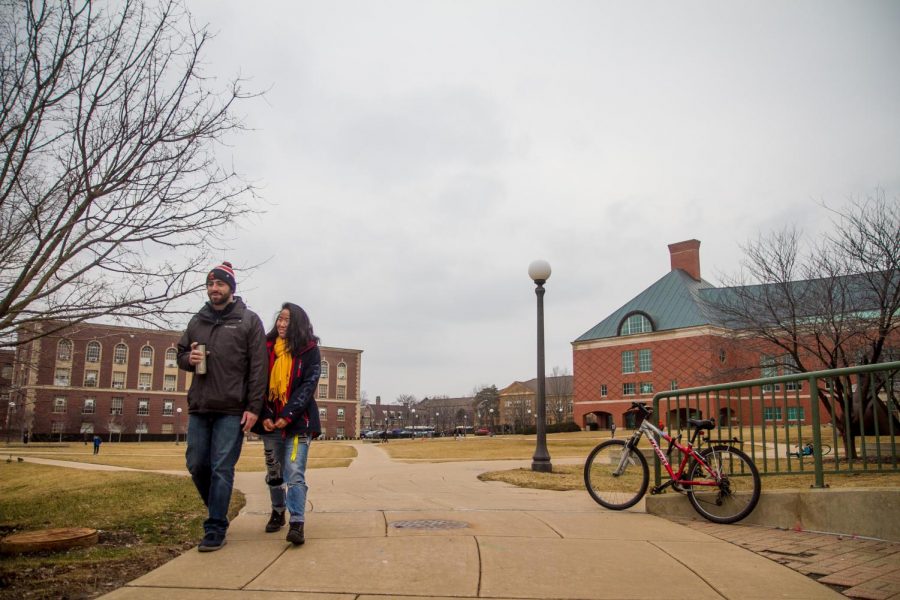Three-year program works to diversify STEM faculty
Benita Ning (right), Senior in Engineering and Kevin Courney (left) Senior in Engineering, walk across the Engineering Quad on Thursday.
Feb 26, 2019
The University is participating in a three-year program to move toward creating a more inclusive and diverse environment within STEM academics.
The Association of Public and Land-grant Universities, an organization dedicated to advancing and strengthening public universities, has created a program to expand diversity within STEM academics, Aspire: National Alliance for Inclusive & Diverse STEM Faculty.
Travis York, assistant vice president of Academic and Student Affairs at APLU, said that the University has been chosen as one of 15 public research universities selected from 45 applicants to participate in this nationwide program.
“The Aspire Alliances are a fairly large project and it has three change initiatives, the national change, the regional change, and the institutional change initiative,” York said. “The University of Illinois has been chosen as one of the first set of institutions to help launch the institutional changes network.”
The institutional change network includes the 15 participating universities and Aspire Alliances. The iChange Network aims to provide professional development to current faculty to increase the inclusivity of their teaching advising and mentoring, York said.
Get The Daily Illini in your inbox!
Assata Zerai, associate chancellor for diversity and professor in LAS, said in an email the University will administrate surveys and hold annual meetings with partners to identify challenges and discuss the best practices within STEM departments.
“We will assemble a team of stakeholders on campus. We will assess the work of diversifying our STEM faculty, identify shortcomings, and create a plan of action to address any shortcomings,” Zerai said.
Throughout the three-year project, the University plans to continue to address implicit bias, eliminate structural impediments when hiring underrepresented groups and retain scholars and students from those groups, Zerai said.
iChange Network will also help institutions of higher education attract, hire and retain more diverse faculty who have traditionally been underrepresented in STEM, York said.
While this program focuses on improving inclusive teaching and creating a more diverse faculty, Aspire Alliances also aims to a track underrepresented students within the STEM academia.
Society’s stereotypes that impose who has natural math and science abilities marginalize STEM fields to lack socioeconomic, gender and racial diversity at universities and in the workforce, Zerai said.
“Diversity is necessary but not sufficient. We must recruit a higher proportion of individuals from these groups underrepresented in academia,” Zerai said. “But we must also promote inclusion to benefit from the innovation brought on by diversity in thought.”
The project ultimately aims to eliminate achievement gaps that might occur across student groups, York said.
“A lot of our research has indicated that at institutions where there are inclusive teaching, advising and mentoring practices and where faculty are more representative of the demographics of their students, underrepresented students tend to achieve an equal and higher rate than in institutions where there’s a disparity,” York said. “So as we seek to develop a more inclusive and diverse STEM faculty, our primary goal is that we’ll see greater success of all students across the STEM field.”
While change within large organizations may seem slow, York said that for the change to really matter, it has to be undertaken thoughtfully and strategically.
“We’re hoping to work with institutions to make sure that the change that occurs is really impactful to them to their students, to their alumni and also to the communities that they serve,” York said.
Editor’s note: Assata Zerai’s name was mispelled as “t.” The article has been changed to reflect the correct spelling. The Daily Illini regrets the error.






